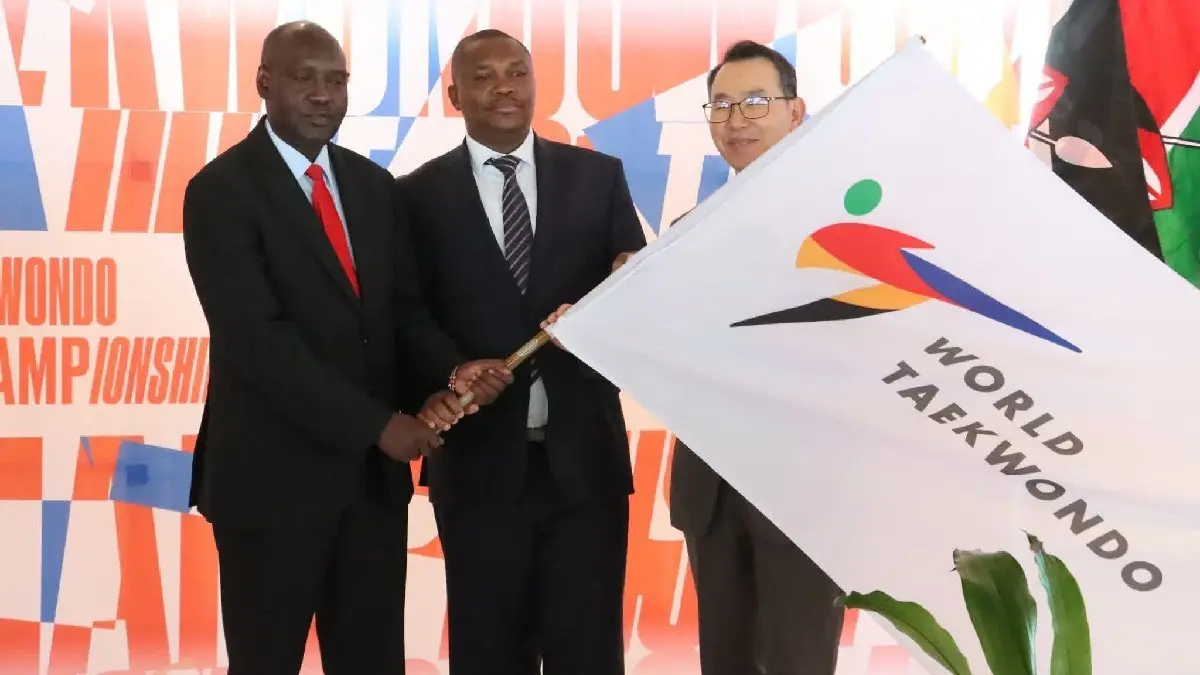The journey of Kenya’s Taekwondo Team for World Under-21 Championship has moved into a decisive phase, with the country confirming a contingent of eight men and eight women for the World Taekwondo Under-21 Championships at Moi International Sports Centre, Kasarani on December 3-6, the first time this global age-group showpiece will be staged on African soil.
Selection unfolded at Phoenix Gymnasium in Kahawa 44, Nairobi, where knock-out and round-robin sessions brought together 80 fighters drawn from across Kenya. The atmosphere was equal parts nerves and resolve, as national dreams were condensed into swift exchanges of kicks, footwork and tactical poise.
Selection day in Nairobi
Organisers opted for an inclusive pathway that gave emerging talent a genuine shot at the stage. The trials blended formats, moving from knock-out to round-robin, a choice that rewarded both consistency and clutch performances, and ultimately produced a balanced squad of eight men and eight women for the Under-21 stage.
For many participants it was the culmination of months of regional and county competition. The gym buzzed with teammates cheering, coaches directing and officials tracking every point, a portrait of Kenyan taekwondo’s growing depth and its hunger to be seen at home in a world championship setting.
A continental first at Kasarani
Kasarani will welcome the sport’s next generation from December 3-6, and it will be the first time the championship is being hosted in Africa. That milestone reflects the sport’s expanding footprint across the continent and Kenya’s readiness to host a world-class event at one of its most storied venues.
For athletes, competing on home mats injects an intangible lift. The roar from the stands in Nairobi can sharpen focus, settle nerves and turn close contests into statement wins, an edge Kenya’s young charges will aim to harness.
Global scale and the registration picture
Taekwondo Federation of Kenya president Suleiman Sumba framed the scale succinctly, noting that over 145 countries are expected to participate. Registration opened five days prior, and 15 nations had already entered, among them the United States, Poland, Germany, Brazil and Sierra Leone, with the final tally set to be known by the fourth of next month.
That early list is a snapshot of the diversity headed to Nairobi, a mix of global heavyweights and emerging programs that gives the championships a competitive texture and enhances the learning curve for Kenya’s rising athletes.
Building toward Los Angeles
Sumba also underscored the long view. The World Taekwondo Under-21 Championships in Nairobi will help flag potential candidates for the Los Angeles Olympics. For a youthful Kenyan squad the experience is not only about medals in December, but also about understanding international pace, refining ring IQ and charting a pathway to the senior elite tier.
With the sport’s cycle accelerating, every international bout becomes a classroom. Lessons from Kasarani can translate into smarter tactics, improved conditioning choices and a clearer sense of what it takes to compete with the best in the world.
Youthful squad seeks experience and support
Taekwondo Federation of Kenya deputy president Philip Akame appealed for sponsorship to power the build-up. He explained that the selection journey began at county level, then progressed to national selection in August, targeting athletes aged 17-21. While some have tasted higher-level competition, many are stepping into national colors after primarily battling at county and regional meets.
That blend can be an advantage. Youth brings fearlessness, and fresh faces often absorb elite habits quickly, especially when exposed to the discipline of a national camp and to high-volume, high-quality sparring.
| CASINO | BONUS | INFO | RATING | |
|---|---|---|---|---|
|
bonus
Join VIP Club for exclusive rewards!
See 4 Bonuses
|
info
High RTP of 97%, crypto-ready payments, top providers ALSI-202410011-FI1 |
|||
|
bonus
90 free spins weekly!
See 4 Bonuses
|
info
OGL/2024/137/0132 secure platform with top casino games & bonuses. |
|||
|
bonus
500% bonus on first 4 deposits!
See 5 Bonuses
|
info
10 crash games, mobile-first site, 500% welcome bonus BK 000678 |
|||
|
bonus
First Bonus: 200% Deposit Bonus
See 3 Bonuses
|
info
8048/JAZ2024-001 HunnyPlay is licensed under Curaçao (365/JAZ). Join now and win crypto instantly! |
Voices from the mat
Stacy Alice, a Kenyatta University Sports Management student selected in the 53kg category, kept her message simple and bold. She voiced belief in the group’s potential and promised a performance that matches the stage in Nairobi.
“Expect good results from us. Expect wins and medals,” Alice said.
Selina Zena, a USIU Computer Science student in the under 56kg welterweight division, spoke about growth through persistence. After four years of training, she was perfect through the selection matches and now eyes a place among the names read out on competition day, a reminder that even after trials, internal competition remains a driver of standards.
“After training for four years, I secured victories in all the selection matches. Hopefully, I will make it to the final squad,” Zena said.
Lesly Oure, studying Electrical and Communication Engineering at Masinde Muliro University of Science and Technology, echoed that sentiment, highlighting the hunger that defines this cohort. For athletes juggling labs, lectures and late-night drills, the call to represent Kenya is both a responsibility and a spark.
Oure also hopes to secure a spot in the final squad.
The road to Abidjan and back to Nairobi
Before stepping into the spotlight at Kasarani, a largely inexperienced team will attend a residential camp in Nairobi, then travel to Abidjan, Cote d’Ivoire, in the first week of November for intense training. The camp is designed to lift match sharpness, improve tactical reactions and embed team coherence under pressure.
The schedule is tight, but that can foster focus. With each session, Kenya’s young fighters will look to build timing on the counter, polish combinations and internalize the situational awareness that separates medalists from also-rans in split-second exchanges.
Why this stage matters
Hosting the World Taekwondo Under-21 Championships gives Kenya more than home-court advantage. It puts the nation’s development system under a friendly microscope and offers a stage where local coaches, administrators and athletes can benchmark their methods, fitness standards and tactical trends against a deep international field.
If the athletes rise to the moment, the ripple effects can be lasting. Strong performances plant seeds of belief in clubs and schools, attract interest from sponsors and can help convert first-time spectators into long-term supporters of the sport.
Key things to watch
- How Kenya’s mix of newcomers and experienced youths adapts to elite tempo in front of a home crowd,
- the breadth of nations on show after registration closes, and how that diversity shapes the competitive landscape,
- the impact of the Nairobi camp and Abidjan training block on tactical cohesion.
The human stories behind the numbers
Behind every bracket lies a journey of early morning conditioning, peer accountability and family support. The profiles of these Kenyan athletes, many still in university, speak to a culture where books and boots share equal billing, a dual pursuit that can sharpen focus and teach discipline that pays off when the clock ticks down and matches are decided by a single point.
For coaches, these weeks are about shaping decision-making under stress. Do you open with a probing attack or settle into counter mode, how quickly do you adjust to an opponent’s rhythm, can you reset mentally after conceding a late kick, these micro-choices often define a campaign as much as any highlight finish.
Participation snapshot and schedule
With registrations open and 15 countries already on the board, Kenya can expect a deep and varied field, from established powers like the United States and Germany to committed programs such as Poland, Brazil and Sierra Leone. The final number of participating countries will be known by the fourth of next month, a mark of the event’s draw and the esteem in which Nairobi’s organization is held.
Kasarani will host the championships from December 3-6, a four-day window that promises ceaseless action. For Kenya, the goal is simple, consolidate the gains from the training block, lean into the energy of the home crowd and make each bout a step forward in a longer journey.
What success could look like
Success will wear several faces. Medals would be a statement, but so too would be breakthrough performances from first-timers, smart tactical adjustments mid-match and the poise to close out tight contests. These are the markers that indicate a program on the rise and a generation ready for bigger stages.
It also means translating the federation’s call for support into tangible backing. With sponsorship and structured preparation, the momentum from a home championship can be converted into sustained progress, from county mats to continental podiums and, eventually, to the glare of the Olympic lights.
Final whistle
This is a moment of promise for Kenyan taekwondo. The trials at Phoenix Gymnasium in Kahawa 44 set the tone, the camp and Abidjan stint will deepen the work, and Kasarani in December will reveal how ready this group is to embrace the world stage.
Eight men and eight women will carry the flag, but they represent far more than 16 names. They embody a country’s ambition to compete with conviction, to learn in real time and to turn a historic home championship into a launchpad for the future.










